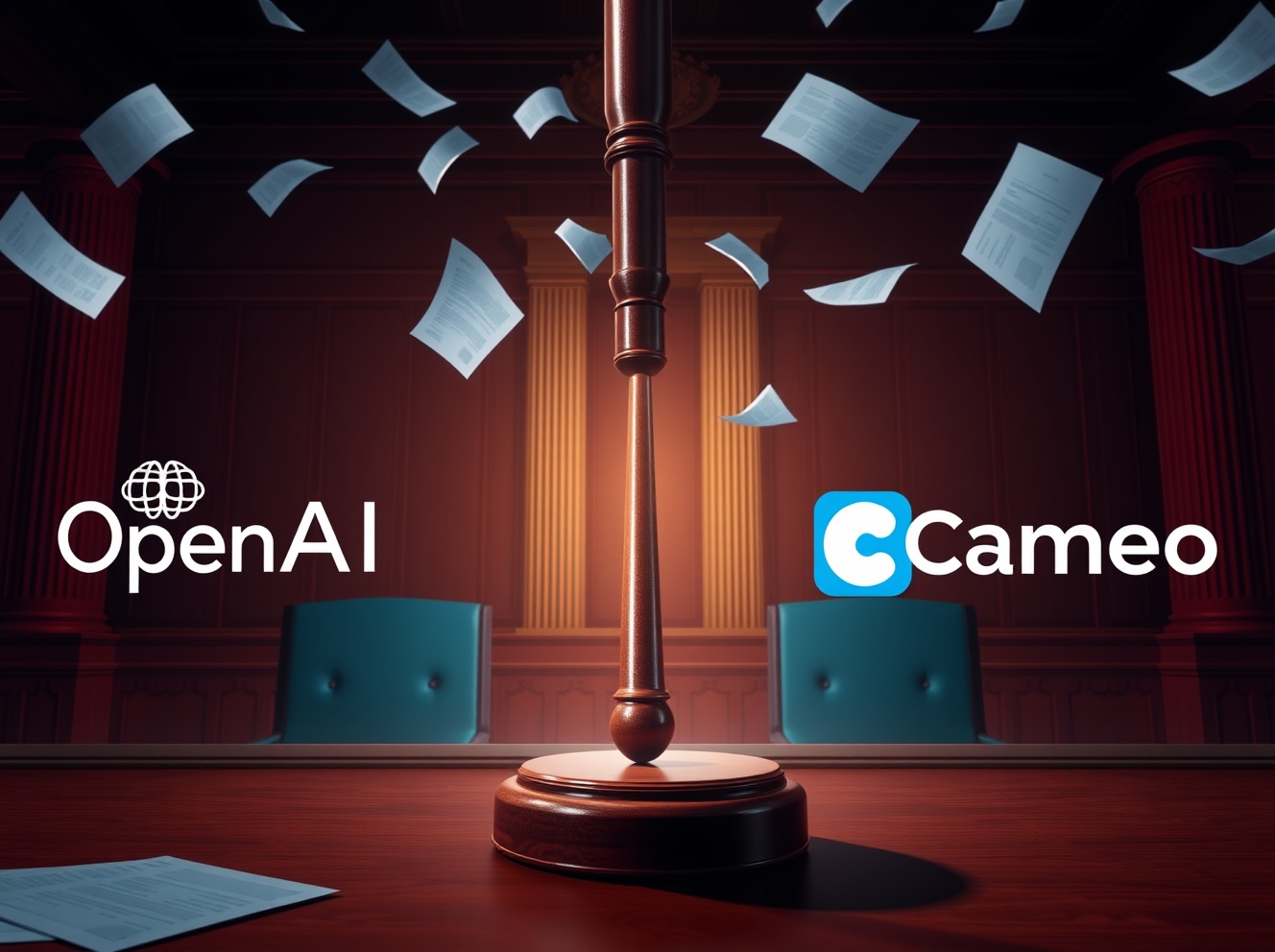AI Browser: OpenAI’s Atlas Poses a Dire Security Threat to Your Data

Share:
BitcoinWorld
AI Browser: OpenAI’s Atlas Poses a Dire Security Threat to Your Data
The digital landscape is constantly evolving, and as of late October 2025, a seismic shift is underway. OpenAI, a name synonymous with cutting-edge artificial intelligence, has thrown its hat into the browser arena with the launch of Atlas. This new AI browser, powered by ChatGPT, promises a revolutionary way to interact with the internet, allowing users to surf using natural language and even delegate complex tasks to an autonomous ‘agent mode’. However, this exciting leap forward comes with a significant and potentially catastrophic caveat: an unsolved security flaw that could expose your most sensitive information.
Unveiling OpenAI Atlas: The Future of the ChatGPT Browser?
OpenAI Atlas represents a bold vision for internet navigation. Imagine conversing with your browser, asking it to find specific information, summarize lengthy articles, or even complete multi-step online tasks without manual clicks. This is the promise of the ChatGPT browser. Its ‘agent mode’ is designed to be a digital assistant on steroids, capable of executing complex instructions autonomously, from booking travel to managing emails. It’s a powerful tool that could redefine productivity and user experience, making the web more accessible and efficient than ever before.
The concept is certainly compelling. For years, browsers have been largely passive windows to the internet. Atlas aims to transform this, turning the browser into an active, intelligent partner. This ambition has naturally sparked considerable excitement, positioning Atlas as one of the most significant browser launches in recent memory. But with great power comes great responsibility, especially when dealing with user data.
The Dire Threat: Unsolved Browser Security Flaws
Despite its innovative features, OpenAI Atlas is debuting with a critical, unsolved security flaw. This vulnerability, as highlighted by experts on Bitcoin World’s Equity podcast, could potentially expose a trove of personal information. We’re talking about passwords, email addresses, and other highly sensitive data that most users would consider sacrosanct. The very autonomy that makes Atlas so appealing — its ‘agent mode’ — also presents a heightened risk if not properly secured. An agent capable of performing tasks on your behalf could, in the wrong hands or due to a system flaw, inadvertently expose or misuse your digital identity.
This isn’t just a minor bug; it’s a fundamental challenge to the trust users place in their digital tools. The implications of such a flaw extend far beyond mere inconvenience, potentially leading to identity theft, financial fraud, and widespread privacy breaches. The race to integrate AI into every facet of our digital lives is accelerating, but this incident serves as a stark reminder that innovation must always be tempered with rigorous security protocols.
Navigating Data Privacy in an AI-Powered World
The emergence of Atlas underscores the growing importance of data privacy in the age of AI. When an AI browser has the capability to understand, process, and act upon natural language commands, it inherently gains access to a vast amount of user-generated content and personal preferences. The unsolved security flaw in Atlas brings this concern to the forefront, forcing users and developers alike to confront difficult questions:
- What data is truly safe? If a browser designed to be intelligent and autonomous has a vulnerability, how can users be assured their most personal details are protected?
- Who controls your data? The ‘agent mode’ implies a level of delegated authority. Understanding the scope of this authority and the safeguards in place is crucial.
- The balance between convenience and security: AI offers unparalleled convenience, but at what cost to individual privacy and digital safety?
The discussion on Bitcoin World’s Equity podcast emphasized that these are not hypothetical concerns but immediate challenges that need addressing for Atlas to gain widespread trust and adoption. The promise of an intelligent web must not overshadow the fundamental right to digital security.
The Broader Browser Security Landscape: AI vs. Privacy
The launch of Atlas reignites the ‘browser wars,’ but this time with AI at the heart of the conflict. On one side, we have browsers like Atlas, pushing the boundaries of AI integration. On the other, we have established players and alternative browsers that prioritize user privacy and security above all else. The contrast is stark:
| Browser Type | Key Features | Approach to AI | Primary Security/Privacy Focus |
|---|---|---|---|
| OpenAI Atlas | Natural language surfing, autonomous agent mode | Deep integration, core functionality | Currently facing significant security concerns |
| DuckDuckGo | Privacy-focused search, tracker blocking | Minimal, primarily for search enhancement | No tracking, enhanced privacy |
| Brave | Built-in ad blocker, crypto rewards, HTTPS Everywhere | Limited, mostly for performance/ad blocking | Privacy by default, user control over data |
| Opera Air | ‘Mindful’ browsing, focus on user well-being | Selective, often for content curation/summarization | User experience, reduced distractions |
This evolving landscape forces users to make a choice: embrace the cutting-edge convenience of an AI browser like Atlas, potentially at the expense of immediate browser security, or opt for established privacy-centric alternatives. The debate isn’t just about features; it’s about fundamental values in our digital interactions.
Beyond Atlas: Other Tech Stories Shaping the Future
While OpenAI Atlas dominated tech discussions, the Bitcoin World’s Equity podcast also touched upon other significant developments that paint a broader picture of the tech world in late 2025:
- Rivian’s Spinoff, Also, Secures Amazon Deal: The electric vehicle manufacturer’s offshoot, ‘Also,’ landed a massive deal with Amazon for thousands of pedal-assist cargo vehicles. This highlights the ongoing innovation in last-mile delivery and sustainable transportation.
- Sesame’s $250M Raise for Conversational AI: A startup from Oculus founders, Sesame, secured substantial funding for a product that is still largely conceptual. This reflects the intense investor confidence and speculative nature surrounding the next generation of conversational AI.
- AWS Outage Exposes Internet Fragility: A significant Amazon Web Services outage crippled large parts of the internet, affecting everything from streaming services to smart home devices like Eight Sleep mattresses. This incident served as a stark reminder of the centralized nature of much of the web’s infrastructure and its inherent vulnerabilities.
These stories, while diverse, collectively underscore a period of rapid technological advancement, high stakes, and emerging challenges across various sectors.
Making Informed Choices: Your Digital Data and the AI Browser
As AI becomes more embedded in our daily tools, the onus falls on both developers to ensure robust security and users to make informed decisions. For those considering an AI browser like Atlas, it’s paramount to weigh the benefits of convenience against the risks to data privacy. Until the reported security flaw is definitively resolved, exercising caution is advisable.
Users should actively seek out information regarding how their data is handled, what permissions AI-powered tools request, and the track record of the companies behind them. The allure of a seemingly effortless digital experience should not override the need for stringent browser security. The ongoing ‘browser wars’ are not just about market share; they are about shaping the fundamental relationship between individuals and their digital lives.
Conclusion: A Cautionary Tale for the AI Era
The launch of OpenAI Atlas is a landmark event, showcasing the incredible potential of AI to transform our internet experience. The promise of a seamless, intelligent ChatGPT browser is undeniably exciting. However, the accompanying security flaw serves as a powerful reminder that pioneering technology often comes with unforeseen risks. As we venture further into an AI-powered future, the imperative for robust browser security and unwavering commitment to data privacy becomes not just a feature, but a foundational requirement. The choices made today, by both innovators and users, will dictate the security and integrity of our digital tomorrow.
To learn more about the latest AI market trends, explore our article on key developments shaping AI models and their institutional adoption.
This post AI Browser: OpenAI’s Atlas Poses a Dire Security Threat to Your Data first appeared on BitcoinWorld.
AI Browser: OpenAI’s Atlas Poses a Dire Security Threat to Your Data

Share:
BitcoinWorld
AI Browser: OpenAI’s Atlas Poses a Dire Security Threat to Your Data
The digital landscape is constantly evolving, and as of late October 2025, a seismic shift is underway. OpenAI, a name synonymous with cutting-edge artificial intelligence, has thrown its hat into the browser arena with the launch of Atlas. This new AI browser, powered by ChatGPT, promises a revolutionary way to interact with the internet, allowing users to surf using natural language and even delegate complex tasks to an autonomous ‘agent mode’. However, this exciting leap forward comes with a significant and potentially catastrophic caveat: an unsolved security flaw that could expose your most sensitive information.
Unveiling OpenAI Atlas: The Future of the ChatGPT Browser?
OpenAI Atlas represents a bold vision for internet navigation. Imagine conversing with your browser, asking it to find specific information, summarize lengthy articles, or even complete multi-step online tasks without manual clicks. This is the promise of the ChatGPT browser. Its ‘agent mode’ is designed to be a digital assistant on steroids, capable of executing complex instructions autonomously, from booking travel to managing emails. It’s a powerful tool that could redefine productivity and user experience, making the web more accessible and efficient than ever before.
The concept is certainly compelling. For years, browsers have been largely passive windows to the internet. Atlas aims to transform this, turning the browser into an active, intelligent partner. This ambition has naturally sparked considerable excitement, positioning Atlas as one of the most significant browser launches in recent memory. But with great power comes great responsibility, especially when dealing with user data.
The Dire Threat: Unsolved Browser Security Flaws
Despite its innovative features, OpenAI Atlas is debuting with a critical, unsolved security flaw. This vulnerability, as highlighted by experts on Bitcoin World’s Equity podcast, could potentially expose a trove of personal information. We’re talking about passwords, email addresses, and other highly sensitive data that most users would consider sacrosanct. The very autonomy that makes Atlas so appealing — its ‘agent mode’ — also presents a heightened risk if not properly secured. An agent capable of performing tasks on your behalf could, in the wrong hands or due to a system flaw, inadvertently expose or misuse your digital identity.
This isn’t just a minor bug; it’s a fundamental challenge to the trust users place in their digital tools. The implications of such a flaw extend far beyond mere inconvenience, potentially leading to identity theft, financial fraud, and widespread privacy breaches. The race to integrate AI into every facet of our digital lives is accelerating, but this incident serves as a stark reminder that innovation must always be tempered with rigorous security protocols.
Navigating Data Privacy in an AI-Powered World
The emergence of Atlas underscores the growing importance of data privacy in the age of AI. When an AI browser has the capability to understand, process, and act upon natural language commands, it inherently gains access to a vast amount of user-generated content and personal preferences. The unsolved security flaw in Atlas brings this concern to the forefront, forcing users and developers alike to confront difficult questions:
- What data is truly safe? If a browser designed to be intelligent and autonomous has a vulnerability, how can users be assured their most personal details are protected?
- Who controls your data? The ‘agent mode’ implies a level of delegated authority. Understanding the scope of this authority and the safeguards in place is crucial.
- The balance between convenience and security: AI offers unparalleled convenience, but at what cost to individual privacy and digital safety?
The discussion on Bitcoin World’s Equity podcast emphasized that these are not hypothetical concerns but immediate challenges that need addressing for Atlas to gain widespread trust and adoption. The promise of an intelligent web must not overshadow the fundamental right to digital security.
The Broader Browser Security Landscape: AI vs. Privacy
The launch of Atlas reignites the ‘browser wars,’ but this time with AI at the heart of the conflict. On one side, we have browsers like Atlas, pushing the boundaries of AI integration. On the other, we have established players and alternative browsers that prioritize user privacy and security above all else. The contrast is stark:
| Browser Type | Key Features | Approach to AI | Primary Security/Privacy Focus |
|---|---|---|---|
| OpenAI Atlas | Natural language surfing, autonomous agent mode | Deep integration, core functionality | Currently facing significant security concerns |
| DuckDuckGo | Privacy-focused search, tracker blocking | Minimal, primarily for search enhancement | No tracking, enhanced privacy |
| Brave | Built-in ad blocker, crypto rewards, HTTPS Everywhere | Limited, mostly for performance/ad blocking | Privacy by default, user control over data |
| Opera Air | ‘Mindful’ browsing, focus on user well-being | Selective, often for content curation/summarization | User experience, reduced distractions |
This evolving landscape forces users to make a choice: embrace the cutting-edge convenience of an AI browser like Atlas, potentially at the expense of immediate browser security, or opt for established privacy-centric alternatives. The debate isn’t just about features; it’s about fundamental values in our digital interactions.
Beyond Atlas: Other Tech Stories Shaping the Future
While OpenAI Atlas dominated tech discussions, the Bitcoin World’s Equity podcast also touched upon other significant developments that paint a broader picture of the tech world in late 2025:
- Rivian’s Spinoff, Also, Secures Amazon Deal: The electric vehicle manufacturer’s offshoot, ‘Also,’ landed a massive deal with Amazon for thousands of pedal-assist cargo vehicles. This highlights the ongoing innovation in last-mile delivery and sustainable transportation.
- Sesame’s $250M Raise for Conversational AI: A startup from Oculus founders, Sesame, secured substantial funding for a product that is still largely conceptual. This reflects the intense investor confidence and speculative nature surrounding the next generation of conversational AI.
- AWS Outage Exposes Internet Fragility: A significant Amazon Web Services outage crippled large parts of the internet, affecting everything from streaming services to smart home devices like Eight Sleep mattresses. This incident served as a stark reminder of the centralized nature of much of the web’s infrastructure and its inherent vulnerabilities.
These stories, while diverse, collectively underscore a period of rapid technological advancement, high stakes, and emerging challenges across various sectors.
Making Informed Choices: Your Digital Data and the AI Browser
As AI becomes more embedded in our daily tools, the onus falls on both developers to ensure robust security and users to make informed decisions. For those considering an AI browser like Atlas, it’s paramount to weigh the benefits of convenience against the risks to data privacy. Until the reported security flaw is definitively resolved, exercising caution is advisable.
Users should actively seek out information regarding how their data is handled, what permissions AI-powered tools request, and the track record of the companies behind them. The allure of a seemingly effortless digital experience should not override the need for stringent browser security. The ongoing ‘browser wars’ are not just about market share; they are about shaping the fundamental relationship between individuals and their digital lives.
Conclusion: A Cautionary Tale for the AI Era
The launch of OpenAI Atlas is a landmark event, showcasing the incredible potential of AI to transform our internet experience. The promise of a seamless, intelligent ChatGPT browser is undeniably exciting. However, the accompanying security flaw serves as a powerful reminder that pioneering technology often comes with unforeseen risks. As we venture further into an AI-powered future, the imperative for robust browser security and unwavering commitment to data privacy becomes not just a feature, but a foundational requirement. The choices made today, by both innovators and users, will dictate the security and integrity of our digital tomorrow.
To learn more about the latest AI market trends, explore our article on key developments shaping AI models and their institutional adoption.
This post AI Browser: OpenAI’s Atlas Poses a Dire Security Threat to Your Data first appeared on BitcoinWorld.











